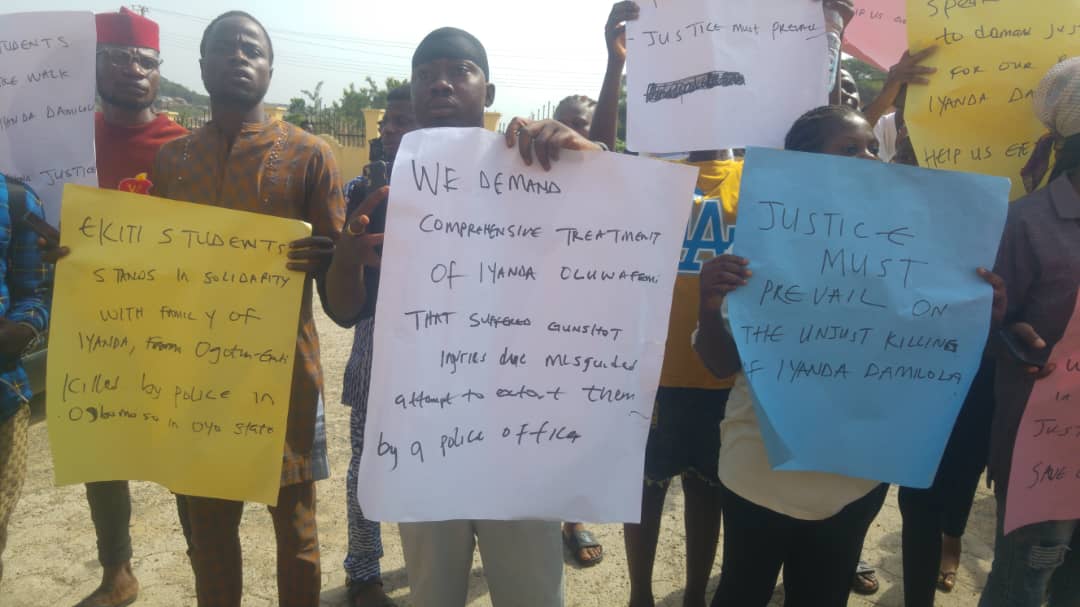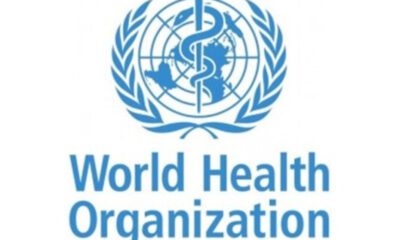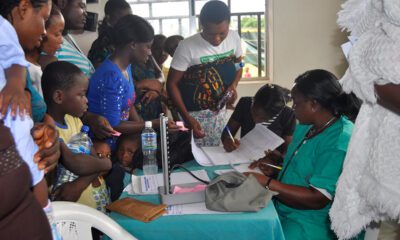News
Nigeria first to introduce new 5-in-1 vaccine against meningitis – WHO

Nigeria has become the first country in the world to roll out a new vaccine – Men5CV – recommended by World Health Organisation(WHO), to protect people against meningitis.
The world health body, in a statement on Friday, said that the vaccine would protect people against five strains of meningococcus bacteria, and described Nigeria’s feat as historic.
It said that health workers would begin an immunisation campaign aimed at reaching one million people.
The statement said that the vaccine and emergency vaccination activities are funded by Gavi, the Vaccine Alliance, which funds the global meningitis vaccine stockpile and supports lower-income countries with routine vaccination against meningitis.
According to the WHO, Nigeria is one of the 26 meningitis hyper-endemic countries of Africa, situated in the area known as the African Meningitis Belt.
It noted that in 2023, there was a 50 per cent jump in annual meningitis cases reported across Africa.
“In Nigeria, an outbreak of Neisseria meningitidis (meningococcus) serogroup C outbreak, led to 1,742 suspected meningitis cases, including 101 confirmed cases and 153 deaths in seven of 36 Nigerian state, between October 2023 and March 2024.
The states are Adamawa, Bauchi, Gombe, Jigawa, Katsina, Yobe, Zamfara.
“To quell the deadly outbreak, a vaccination campaign was undertaken on 25–28 March 2024 to initially reach more than one million people aged 1-29 years,” it said.
The statement noted that meningitis was a serious infection that leads to the inflammation of the membranes (meninges), that surround and protect the brain and spinal cord.
“There are multiple causes of meningitis, including viral, bacterial, fungal and parasitic pathogens.
“Symptoms often include headache, fever and stiff neck. Bacterial meningitis is the most serious, and can also result in septicaemia (blood poisoning). It can seriously disable or kill within 24 hours,” the statement added.
It quoted Dr Tedros Ghebreyesus, WHO Director-General, as saying that meningitis was an old and deadly foe, adding that the new vaccine holds the potential to change the trajectory of the disease, preventing future outbreaks and saving many lives
“Nigeria’s rollout brings us one step closer to our goal of eliminating meningitis by 2030,” Ghebreyesus said.
He said that the revolutionary new vaccine offers a powerful shield against the five major strains of the meningococcal bacteria – A, C, W, Y and X – in a single shot.
All five strains cause meningitis and blood poisoning.
According to him, this provides broader protection than the current vaccine used in much of Africa, which is only effective against the A strain.
He said that the new vaccine has the potential to significantly reduce meningitis cases and advance progress in defeating meningitis.
“This is especially important for countries like Nigeria where multiple serogroups are prevalent.
“The new vaccine uses the same technology as the meningitis A conjugate vaccine (MenAfriVac®), which wiped out meningococcal A epidemics in Nigeria,” the WHO boss said.
The statement quoted Prof. Muhammad Pate, Nigeria’s Minister of Health and Social Welfare, as saying that Northern Nigeria, particularly the states of Jigawa, Bauchi and Yobe, were badly hit by the deadly outbreak of meningitis.
“This vaccine provides health workers with a new tool to both stop this outbreak and also put the country on a path to elimination,” Pate said.
According to him, Nigeria has done a lot of work preparing health workers and the health system for the rollout of the new vaccine.
“We got an invaluable support from our populations in spite of the fasting period, and from our community leaders, especially the Emir of Gumel in Jigawa, who personally launched the vaccination campaign in the state.
“We’ll be monitoring progress closely and hopefully expand the immunisation in the coming months and years to accelerate progress,” he said.
The minister said that the new multivalent conjugate vaccine took 13 years of efforts and was based on a partnership between PATH and the Serum Institute of India.
“Financing from the UK government’s Foreign, Commonwealth and Development Office was critical to its development,” he said.
Pate said that in July 2023, WHO prequalified the new Men5CV vaccine (which has brand name MenFive®), and in October 2023 issued an official recommendation to countries to introduce the new vaccine.
According to him, Gavi allocated resources for the Men5CV rollout in December 2023, which is currently available for outbreak response through the emergency stockpile managed by the International Coordinating Group (ICG), on Vaccine Provision.
He added that the roll-out, through mass preventive campaigns, was expected to start in 2025 across countries of the Meningitis Belt.
Mr Andrew Mitchell, UK Minister for Development and Africa, was also quoted as saying that the rollout of one million vaccines in northern Nigeria would help save lives, prevent long-term illness and boost the goal of defeating meningitis globally by 2030.
“This is exactly the kind of scientific innovation, supported by the UK, which I hope is replicated in years to come, to help us drive further breakthroughs, including wiping out other diseases,” Mitchell said.
He said that WHO has been supporting the Nigeria Centre for Disease Control and Prevention (NCDC), in responding to the meningitis outbreak in the country.
According to him, the areas of support include disease surveillance, active case finding, sample testing and case management.
“WHO and partners have also played a vital role in supporting Nigeria to prepare for the rollout of the new vaccine and training health workers,” he said.
Dr Nanthalile Mugala, PATH’s Chief of Africa Region, was also quoted as saying that meningococcal meningitis had tormented countries across Africa, year after year.
“The introduction of MenFive® in Nigeria heralds a transformative era in the fight against meningococcal meningitis in Africa.
“Building on the legacy of previous vaccination efforts, this milestone reflects over a decade of unwavering, innovative partnerships.
“The promise of MenFive® lies not just in its immediate impact but in the countless lives it stands to protect in the years to come, moving us closer to a future free from the threat of this disease,” Mugala said.
According to her, in 2019, WHO and partners launched the global roadmap to defeating meningitis by 2030.
“The roadmap sets a comprehensive vision towards a world free of meningitis, and has three goals including the elimination of bacterial meningitis epidemics.
Another goal is the reduction of cases of vaccine-preventable bacterial meningitis by 50 per cent and deaths by 70 per cent, as well as the reduction of disability and improvement of quality of life after meningitis, due to any cause.
Ms Aurélia Nguyen, Chief Programme Officer at Gavi, the Vaccine Alliance, was also quoted as saying that with outbreaks of infectious diseases on the rise worldwide, new innovations such as MenFive® were critical in helping the fight back.
She said that Vaccine Alliance funds the global stockpile as well as vaccine rollout in lower-income countries.
“This first shipment signals the start of Gavi support for a multivalent meningococcal conjugate vaccine (MMCV) programme which, with the required donor funding for our next five years of work, will see pentavalent meningococcal conjugate vaccines rolled out in high-risk countries.
“Thanks to vaccines, we have eliminated large and disruptive outbreaks of meningitis A in Africa, now we have a tool to respond to other serogroups that still cause large outbreaks resulting in long-term disability and deaths,” Nguyen said.
According to her, following Nigeria’s meningitis vaccine campaign, a major milestone on the road to defeat meningitis is the international summit on meningitis taking place in Paris in April 2024, where leaders will celebrate progress, identify challenges and assess next steps.
“It is also an opportunity for country leaders and key partners to commit, politically and financially, to accelerate progress towards eliminating meningitis as a public health problem by 2030,” she said.
News
Fuel scarcity: Lagos residents stranded as petrol hits N1,000 per litre


Some residents of Badagry, Lagos were stranded on Tuesday as most commercial vehicles plying the area were off the road due to scarcity of Premium Motor Spirit, PMS, otherwise called petrol.
A NAN correspondent, who monitored the situation, reports that many workers and business people were sighted waiting endlessly at some bus stops due to the unavailability of vehicles.
NAN further reports that the situation led to hike in transport fare as a litre of petrol in the area now sells as high as N1,000, while fare rose from N800 to N1, 500 from Badagry to Mile 2.
At some popular bus stations in Badagry – Aradagun, Mowo and Agemowo, scores of residents were seen struggling to enter a few available taxis and commercial buses.
Mr Johnson Afilaka, a Badagry resident, said he could not go to work on Monday due to an increase in transport fare from Badagry to Mile 2.
“Today, we queued up for buses, but none came. A few taxis that came raised their fares so high.
“Government should come to our aid in Badagry by providing some of the Lagos BRT buses for us here,” he said.
Mrs Christiana Adigun, a staff of the National Population Commission (NPC), said she could not drive to her office due to difficulty in getting petrol for her car.
She said that despite being willing to buy a litre at N1,000, it was difficult to get the product, adding that getting a commercial vehicle to her office also posed another challenge.
On sales of petrol in Badagry, NAN reports that only the NNPC fuel station at Aradagun and the Mobil fuel station in Badagry were selling at official prices of N568 and N610, respectively.
However, other independent marketers with fuel stations were selling between N950 and N1,000 per litre.
Mr Friday Ajasa, a motorist, said his car had been on the queue at NNPC Aradagun since 7.00.a.m, adding that as at 12.00.noon, he was yet to get the product.
“When we blame the government for the scarcity, we should as well blame petrol marketers in Badagry for the hike because they are not helping the situation.
“Some of the cars in the queue at the fuel stations in Badagry belong to cross-border illegal petrol dealers who usually take the product to the Benin Republic to re-sell.
“Most of the significant marketers here prefer to sell to them rather than sell to residents, which is the height of unpatriotic conduct.
“When these people enter, they buy up to 350 litres of petrol inside one car, and for us who just wanted 15 litres in our vehicles, they will tell you that petrol has finished,” he said.
Mrs Funke Alabi, a motorist on queue at Mobil filling station, called on security agents to check excesses of petrol pump attendants in the area.
Explaining the reason for petrol scarcity, Alhaji Abdul-Ganiyu Adelani, the Chairman, Independent Petroleum Marketers, Badagry, blamed the scarcity on lack of product at NNPC tank farm.
Adelani urged the NNPC to make available more petrol in their tank farms so that all filling stations in Lagos and other parts of Nigeria would get enough supply.
News
Ogun alerts residents on flooding, urges dwellers of wetland to relocate


Ogun State Government, on Tuesday urged residents on wetland areas to relocate to safer ground before the rain commences fully.
The rain according to the Nigeria Meteorological Agency (NIMET) and the Nigeria Hydrological Services Agency (NIHSA) would commence from March and end in December, 2024 with an average rainy period of two hundred and thirty-nine days (239) and an average precipitation of 1786.5mm, affecting sixteen out of the twenty local government areas of the state.
The state Commissioner for Environment, Mr. Ola Oresanya, who made this known during the year 2024 Ogun State Flood Alert in conjunction with the Ogun-Osun River Basin Development Authority (OORBDA) held at the Olusegun Osoba Press Center, Oke-Mosan, Abeokuta, also said that local government areas such as Imeko-Afon, Odeda, Abeokuta North and Abeokuta South would experience the lowest rainfall.
The commissioner, while noting that people who are located in the hilly areas are going to experience erosion as a result of the speed of the water, called for calm as the state government is putting measures in place to cushion the effects of the expected heavy rainfall.
“It is either you relocate from the area or you elevate; may be you want to reconstruct your house or do some kind of elevation if you must stay in that area. Every year, we talk about relocation. It is not easy to relocate. If you must leave in those areas, make sure that your electronics, your chairs, whatever can be damaged is being elevated.
“When we talk about relocation and elevation, it is going to be predominantly around this area. People leaving within the wetland of the state are supposed to prepare for this increase in the height of the water because we are going to have a retention of this lockdown around this period.
“So, people who are located in the hill areas are going to have some kind of erosion because of the speed the water will take in running down around the Ilaro area and some areas in Ota. We are going to have what we call erosion that is going to accompany this kind of flooding for the year.
“The other areas that we will have the impact which is later on are people that are leaving within the wetland of the state and the wetland area are predominantly Southern parts of the state and this are almost flat land, low line land because this are the border towns between Lagos and Ogun State,” he said.
Oresanya also said that the state government is set to complement its various efforts at addressing the menace of flooding with the construction of 2,975.6m length of drainage channels and mini-bridges/culverts and the desilting and clearing of 56.150m length of river across the state.
“The state government wish to complement its efforts in addressing the menace of flooding by the construction of 2,975.6m length of drainage channels and mini bridges/culverts, desilt and clear 56.159m length of river/stream courses and desilt 40,000m length of drainage channels across the three senatorial districts of the state.
“Some of the areas includes construction of drainage channels and culverts at Wesley Primary School, Ijebu-Ode; reconstruction of dilapidated culvert at Saje Dumpsite road; Apakila (Abeokuta); Igbosoro (Ogijo, Sagamu), Imasai, desilting of rivers/stream courses at Yemile (Ijebu-Ode); Sensen river (Sagamu), Onibuku (Ota); Odo-funfun (Oja-Odan), Opa Aro (Isheri), Sokori river and tributaries while desilting of drainages channel will take place at Abeokuta, Ifo, Ijebu-Ode, Sagamu, Ilaro, Ota among others,” he said
The commissioner, who noted that the length of the raining season for the coastal areas ranges between 250 to 292 days while that of inland areas is between 200 to 250 days, encouraged farmers to start planting.
He urged fish farmers to harvest before the peak of the raining season in July and advised poultry farmers against stocking density during the period, which started two months back.
Oresanya also called on the people of the state to apply for ‘drainage permit’ before constructing their drainages.
This, he said, would ensure that drainages have the right elevation for the passage of water.
The drainage permit, he added, will guide residents against building on flood plains and wetlands unknowingly during the dry season.
In his remarks, the Managing Director and Chief Executive Officer, Ogun-Osun River Basin Development Authority (OORBDA; Engr. Olufemi Odumosu said that OORBDA has been holistic while focusing on the structural measures for flood control.
According to him, Oyan Dam has been responsible for the supply of bulk water to Ogun and Lagos states, irrigation infrastructure for agriculture, flood control, hydro power generation potentials, researches and transportation as well as tourism which he said is yet to be fully tapped.
Odumosu mulled the need for a collaboration between OORBDA and the Ogun State government in the area of tourism, saying that the partnership would help to generate more revenue.
News
Ekiti students protest, demand justice for slain Corps member


Ekiti students, under the aegis of the Federation of Ekiti State Students’ Union, on Tuesday demanded justice for a corps member of Ekiti origin allegedly killed by a trigger-happy policeman at Ogbomoso in Oyo State last week.
FESSU National President, Benjamin Adekunle, called for a proper investigation into the shooting and killing of the Corps member with a view to bringing the perpetrator to justice
Adekunle spoke at the Ekiti State House of Assembly complex in Ado Ekiti when he led placards carrying FESSU members, who sang solidarity songs, in a peaceful protest to the Assembly over the killing.
He said that the protest was to call the attention of the Ekiti Assembly Speaker, Adeoye Aribasoye so that he could liaise with his Oyo State counterpart to ensure justice for the deceased and the family.
Recall that students of LAUTECH had last week called for justice for the corps member allegedly killed by the police and condemned police brutality in strong terms.
The deceased, a corps member serving in Ibadan, had attended the convocation party of his brother, Oluwafemi Iyanda, in Ogbomoso when the incident whereby he was shot dead allegedly by the police happened.
The brother, Oluwafemi, a graduate of LAUTECH, had narrated, “We were at a lounge in the Under-G area for a convocation party around 2am when we heard that some people were fighting outside. When we discovered that the place was getting rowdy, we stepped out only to see policemen dispersing the crowd and shooting directly at the people.
“I sustained bullet wounds, but my brother, who came for my convocation, was shot in the head. He was confirmed dead at the LAUTECH Teaching Hospital and was taken to the mortuary,” he had said.
The FESSU president told the Ekiti Assembly speaker, “We demand a swift investigation into this matter and the culprit should be brought to book. We demand for compensation for the family of the deceased.
“We also demand comprehensive medical treatment for his brother who sustained a gunshot injury. He is at home and his health is deteriorating.
“We demand an end to police brutality in Nigeria. Police should be our friend, save us and not kill us.
“We have come to the House of Assembly today to speak with the Speaker to liaise with his counterpart in Oyo State for swift justice for Iyanda Damilola and Iyanda Oluwafemi. They are from Ekiti State and raised and brought up in Ogotun Ekiti.”
Responding, the Speaker, Aribasoye, condemned the killing of the corps member, describing it as senseless
The Speaker said, “We express our condolences to the family and we condemn the killing and unprofessionalism of the police officer who murdered one of us, a youth from Ekiti State who is also serving his fatherland in cold blood.
“We condemn it and the House will be sitting. We will have a position during our plenary. Our resolutions will be passed and I know the House will condemn it. It is so unfortunate his life was cut short,” the speaker said.
-
capital market2 years ago
Rt.briscoe, FBNH, Others halts negative performance of stock market
-
Finance3 months ago
Court orders Sen. Victor Umeh to repay N136m bank debt to AMCON
-



 Abuja Update2 months ago
Abuja Update2 months agoUNDP, FG partnership needed to achieve inclusion, equity- Minister
-
Abuja Update1 month ago
Banks drive stock market performance with N147bn gain
-



 Business1 week ago
Business1 week agoTingo Group unveils Tingo Electric, Tingo Cola drink at Lagos launch
-



 Health2 weeks ago
Health2 weeks agoCapacity training will reduce migration of health workers- NPHCDA
-



 Infotech4 weeks ago
Infotech4 weeks agoWorld Backup Day: NITDA urges Nigerians to ensure backup of data
-
News4 months ago
Oil thieves sponsoring malicious media campaign against Navy – Spokesman












